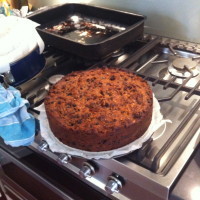Dawn Barker's Blog, page 10
January 16, 2013
Perth Writers Festival Programme Launch
[image error]Last night I attended my first event where I was able to officially call myself an author. Very exciting!
I attended the programme launch of the 2013 Perth Writers Festival, held in the beautiful Winthrop Hall of the University of Western Australia. The hundreds of attendees were treated to some talks from the organisers of the festival, a video of some of the authors, and a taste of the highlights of the festival. Already my ‘to read’ list has grown just by the sound of some of the authors. And they have some big name authors: Margaret Atwood, China Mieville (who I’ve never read but absolutely must because I’ve heard great things), Anna Funder, Kate Grenville…
As a psychiatrist, I’m really looking forward to hearing both Kevin Powers and Major General John Cantwell talk about war and the effects of that trauma on soldiers (I wrote a post about these authors here) as I have an interest in this field. I’m also really looking forward to sessions on HBO TV dramas – The Sopranos and Boardwalk Empire are two of my favourites, and I’d love to hear more about the interface of the fantastic script writing and television.
And of course, I’m looking forward to my own talks. Here they are!
Friday 22nd February, 5-6pm
The new novels of Dawn Barker and Caroline Overington, Fractured and Sisters of Mercy, deal with flawed characters and imperfect families. They talk about the big social issues they explore through fiction.
Sunday 24th February, 3.30-4.30pm
The moving new novels by Dawn Barker, Jacinta Halloran and Natasha Lester explore families in the midst of medical crisis. They talk to Angela Meyer about writing with a medical perspective and the rich content it provides for fiction.
You can find the full programme here.
December 18, 2012
Creating Christmas memories
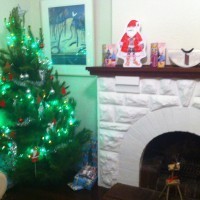 Last weekend, we loaded our three children into the car and drove out to a farm to choose our Christmas tree. Instead of traipsing through the snow as I did in Scotland as a child, we skittered around the shadows of the stubby trees growing in the sandy soil of a blistering hot West Australian summer day. It would have been easier to drag our plastic tree down from the loft, or to go to the local market and buy a pre-cut tree, but this year, I wanted to do it properly.
Last weekend, we loaded our three children into the car and drove out to a farm to choose our Christmas tree. Instead of traipsing through the snow as I did in Scotland as a child, we skittered around the shadows of the stubby trees growing in the sandy soil of a blistering hot West Australian summer day. It would have been easier to drag our plastic tree down from the loft, or to go to the local market and buy a pre-cut tree, but this year, I wanted to do it properly.
As we loaded the tree into the car, filling it with the scent of pine, I saw the wide eyes and grins of my girls. My oldest child is 3 now, an age of wonder and an age at which her memories will stay with her until she grows up. I remember the Christmases of my own childhood: the anticipation; waking in the night and peering to the pillowcase at the end of my bed to see if Santa had been yet; the thrill of seeing that Rudolph had drunk his saucer of water and Santa had finished his dram of whiskey and shortbread, save for a few crumbs on the plate. I remember decorating the tree, watching movies on Christmas Eve, singing carols, and the annual visit by Santa Claus to our family parties to hand out the gifts.
It was magical.
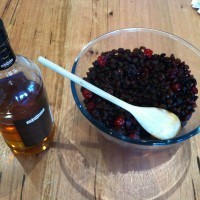
Christmas cake – Scottish twist
As an adult, I lost that excitement. My associations with this time of year were all changed when I moved to Australia, and my traditions didn’t fit in here. Australia has its own traditions: the morning swim at the beach; cooking the turkey in the Weber; drinking cold white wine surrounded by the thrum of cicadas. But this year, I wanted to recreate some of the magic that I remember for my children.
After we decorated the tree, we washed the sticky pine needle sap from our hands before we switched the lights on. My children cheered and laughed. Every night, they rush to their advent calendar after dinner to count down the days until Christmas (and eat the chocolate!). We’ve posted letters to Santa and check the mail every day for his reply. We’ll leave Santa and Rudolph their drink and snack on the hearth of our fireplace for their visit on Christmas Eve, and we’ll play Christmas carols while we open our gifts on Christmas morning.
Can we create these memories for the children? Is it really these things that I remember, or is it that I associate these things with a time of year when our entire extended family would sit down together and share a meal, when all the cousins played together, when we’d move to another family member’s house in the evening to continue playing and eating and drinking until we trod home through the snow to our warm beds, exhausted but happy?
My children will remember our new traditions here, but most of all they will remember the time spent together as a family, the fun and the laughter and the love as I carry them asleep into their beds, tuck them in and wish them a Merry Christmas.
December 4, 2012
The Next Big Thing
A week ago, I was tagged by writer Charlotte Nash to take part in The Next Big Thing, a ‘chain blog’. To avoid bad luck for breaking the chain, I am delighted to take part and answer some questions about my book. You’ll see at the end that I’ve tagged some other writers I’ve met along the way who will do the same next week.
1. What is the working title of your next book?
My first novel is called Fractured
2. Where did the idea come from for the book?
In my day job as a psychiatrist, I’ve spent years learning about mental illness and working with families affected by it. I have to stress that this book is complete fiction and not at all based on any real clinical cases, but I have always wondered what happens to families once they leave my office. When I had my first child, some of my experiences as a new mother inspired me to be brave enough to start writing Fractured and combine the themes of parenting, mental illness and relationships.
3. What genre does your book fall under?
I would say it’s contemporary fiction. It has elements of literary fiction, but it has a plot structure that is more dramatic. I wrote the book in the best way I could without thinking of the conventions of genre – not everything fits into a neat box.
4. What actors would you choose to play the parts of your characters in a movie rendition?
I’ll go with an Aussie theme and say that I think Melissa George would make an excellent Anna, and Sam Worthington would be great as Tony.
5. What is the one sentence synopsis of your book?
Tony and Anna are thrilled when their first baby, Jack, is born, but when Anna begins to act oddly, then disappears with the baby, Tony realises that something is really wrong…
I’m struggling to fit the synopsis into one sentence so here’s a link to the back cover blurb too!
6. Will your book be self published or represented by an agency?
I’m represented by Benython Oldfield of Zeitgeist Media Group and the book will be published by Hachette Australia in March 2013.
7. How long did it take you to write the first draft of the manuscript?
The first draft took me about six months – with the support of the Queensland Writers Centre’s Year of the Novel online course. I set myself a goal of 500 words per day, 5 days a week, and kept going until the first draft was finished.
8. What other books would you compare this story to in your genre?
I think Fractured would appeal to readers who liked Caroline Overington’s I Came To Say Goodbye, We Need To Talk About Kevin by Lionel Shriver, and perhaps some of Jodi Picoult’s books.
9. Who or what inspired you to write this book?
As I mentioned above. I’d had the idea for quite a while, but being a full time new mother after working in medicine for many years gave me the push I needed to start writing seriously. When working as a doctor, I was emotionally worn out by the time I got home from work and didn’t have the head space to tackle a project like Fractured. I was exhausted in other ways with a newborn, but used my baby’s nap times to sit down and write.
10. What else about the book might pique the readers’ interest?
I hope that my experiences as both a psychiatrist and as a mother add authenticity to this book.
So that’s it! Look out next week for the following writers’ answers to the same ten questions:
December 3, 2012
Perth Writers Festival 2013
I’m very excited to say that I’ve just found out that I’ll be appearing at Perth Writers Festival which is on 21-24 Feb 2013. I went to this wonderful event in 2012 as a reader and loved every minute of it in the gorgeous grounds of UWA despite the heat of a West Australian summer! There are some brilliant writers appearing including Margaret Atwood(!!), Kate Grenville, Kevin Powers, and Caroline Overington.
More information on sessions will follow, and I hope to see some of you there…
November 11, 2012
Here it is…
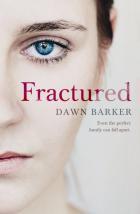 I was checking Hachette Australia’s website this morning and saw that they have now released their ‘Best of March 2013′ list. I’m thrilled to see that Fractured is on there! The cover is now finalised and I love it – it suits the book perfectly and I can’t wait to see it in the bookshops…
I was checking Hachette Australia’s website this morning and saw that they have now released their ‘Best of March 2013′ list. I’m thrilled to see that Fractured is on there! The cover is now finalised and I love it – it suits the book perfectly and I can’t wait to see it in the bookshops…
When one novel ends, another begins.
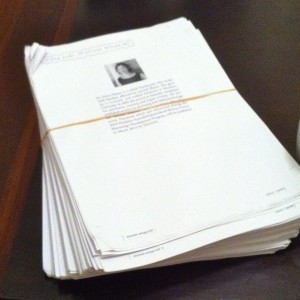 A few days ago, I bundled up over 400 pages of loose A4 paper, secured an elastic band round them and put them in an envelope to send back to my editor and publisher at Hachette. It was the proof pages of Fractured – pretty much the final version of the novel. It was an odd experience: this edit was quite quick, and there were no major changes, really just typos and a few things that hadn’t been caught in the copy edit. It felt…finished.
A few days ago, I bundled up over 400 pages of loose A4 paper, secured an elastic band round them and put them in an envelope to send back to my editor and publisher at Hachette. It was the proof pages of Fractured – pretty much the final version of the novel. It was an odd experience: this edit was quite quick, and there were no major changes, really just typos and a few things that hadn’t been caught in the copy edit. It felt…finished.
I had previously told myself that when I had let Fractured go, I would take a few months off writing: I’d read lots of books, get fit, relax, and prepare for publication in March – and all that entails. Then, next year, I would print out the first draft of a novel that I wrote earlier this year, and begin pruning and shaping it into my next book.
But as soon as I packed away my notes for Fractured, I felt the urge to write something new. I couldn’t wait. I bought a new, blank, notebook and already I’m jotting down snippets that could be the start of something: news stories, overheard phrases and conversations, a place, the look of a stranger. My brain is whirring and I see story ideas everywhere. I find myself formulating premises for novels, thinking about the story arc, the synopsis, the blurb. Ideas that were separate stories are starting to merge into a possible novel and I’m excited and looking forward to starting the whole process again. Perhaps it’s because I’ve spent months now in the ‘editing’ mode: being logical, methodical, detached. The other side of my brain is crying out for some action.
I won’t dismiss my already-written second novel though. I was as enthusiastic about that project at the start as I am now about a new novel, so I will go back to it and see how I feel about it. In the meantime, I will keep collecting ideas, and store them away until a new book emerges.
Writing a second novel will be hard. I’ve yet to see how Fractured will be received, but it’s a book that I thought about for years and years before writing and I suspect much of it was ‘written’ before I ever sat down at the keyboard. But I have loved every step of my journey towards publication and know without a doubt that I want to do it again.
October 19, 2012
Congratulations to the 2012 Hachette/QWC manuscript development programme shortlist!


I saw today that the shortlist for the 2012 Hachette/Queensland Writers Centre manuscript development programme has been announced (you can see it here.) Congratulations to the nine writers selected!
It brought back lots of memories of my own shortlisting in 2010 (I wrote about the experience here). So much has happened in the two years since I participated in the programme. The manuscript that I entered in 2010 has changed so much: its gone through two or three more drafts of my own, a structural edit and a copy edit to become Fractured. Having my novel published is of course amazing, but even without that, the programme gave me fantastic knowledge and contacts, and a sense of validation as a writer. For me, that was the moment that I started to believe that maybe I could write, that maybe my manuscript could be a novel that others would want to read.
A few fantastic novels have come out of this programme: Favel Parret’s Past the Shallows which was not only shortlisted for the Miles Franklin award but has won a squillion other prizes, and Philippa Fioretti’s The Book of Love and Fragment of Dreams. DR Dymock, part of my own 2010 cohort, will have his non fiction book on the aviator Bert Hinkler published in 2013 by Hachette. Others have had their work released by other publishers. But regardless of publication, the programme gives writers access to the industry and feedback on their work – invaluable.
Congratulations again to the selected writers and good luck with the retreat!
October 14, 2012
The bound proof of Fractured is here!
On Friday I returned home from a trip to the park to see the now familiar brown jiffy bag at my front door from my publisher. I ushered the kids inside then tore it open to find the latest hard copy of my manuscript, and the bound proof of Fractured! This is the first chance I’ve had to see it as an actual book rather than a computer file or a pile of A4 paper, and it brought tears to my eyes. I can now picture it on the shelves, or in someone’s hands and it’s really emphasised that Fractured is almost a real book! I love the front cover, it’s very striking and now I can’t imagine it looking any other way.
I started to flick through the pages and am amazed at how different it seems in a book format compared to the A4 manuscript. Not just physically – although seeing the chapters and scenes laid out looks fantastic – but there’s something different about reading a ‘book’. It must be a similar process to that of reading on screen versus on paper: I write on the computer, but do print out the work to edit it. For some reason, I pick up issues on paper far more easily than I do on screen. It’ll be interesting to see if there are similar differences when I read through this bound version of Fractured, when I’ll see it more as a reader will.
This copy is still to be proof read – my next task – but it’s the version that goes out soon to booksellers and media. That is both incredible exciting and scary!
September 25, 2012
War and PTSD
There has been lots of coverage in the media over the last week or so about post traumatic stress disorder (PTSD) in war veterans, triggered by the recent release of two books: The Yellow Birds by Kevin Powers and Exit Wounds: One Australian’s war on terror by Major General John Cantwell. Each book deals with the traumas of combat from different perspectives – The Yellow Birds is a novel, Exit Wounds is non-fiction.
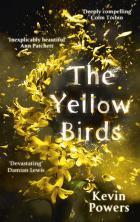
I’ve just finished reading The Yellow Birds, a brilliant and confronting story about the war in Iraq from one soldier’s perspective. The author, Kevin Powers, is a war veteran, and clearly his experience is what makes the book come alive: this couldn’t have been written by anyone other than someone with first hand experience of the war. It’s full of vivid descriptions of the contrasts of Iraq: the arid desert towns with orchards of flowering trees, and the sounds of the call to prayer merging with the wails of mourners and the cacophony of gunfire. This theme of contrasts is exemplified most by the detached, matter of fact way in which Powers describes horrific experiences. One of the symptoms of PTSD is a feeling of detachment, and the narrator’s voice is a brilliant way to show the emotional numbing that seems necessary for the mind to cope with severe, persistent trauma. Some of the most moving passages related to the emotional games these young soldiers – teenagers – played with themselves. They felt relieved, happy even, if someone else was killed: after all, they had survived. The psychological conflict and guilt that this emotion would create is profound.
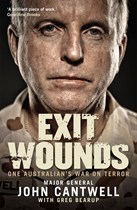 I haven’t read Exit Wounds yet, but I will. I watched an interview with the author, Major General John Cantwell, and was moved to tears by his story. He was able to describe the terrible symptoms of PTSD: avoidance of situations that remind him of his experiences of combat, a reliving of the events, numbing, hyper-arousal and the effects on his functioning (you can see a complete list of symptoms and diagnostic criteria here). This is a man who was at the top of his career, a tough, stoic soldier, who has been brave enough to publicly admit to his disabling mental health problems. What struck me most was his ongoing sense of guilt and personal responsibility for the deaths of soldiers under his command.
I haven’t read Exit Wounds yet, but I will. I watched an interview with the author, Major General John Cantwell, and was moved to tears by his story. He was able to describe the terrible symptoms of PTSD: avoidance of situations that remind him of his experiences of combat, a reliving of the events, numbing, hyper-arousal and the effects on his functioning (you can see a complete list of symptoms and diagnostic criteria here). This is a man who was at the top of his career, a tough, stoic soldier, who has been brave enough to publicly admit to his disabling mental health problems. What struck me most was his ongoing sense of guilt and personal responsibility for the deaths of soldiers under his command.
I have worked with many patients with PTSD, including emergency service personnel and refugees, who have witnessed horrific traumas. They usually don’t have ‘just’ PTSD: often depression, other anxiety disorders, and drug and alcohol abuse are present, not to mention the terrible effect on their ability to hold relationships or work. These patients have often kept their symptoms hidden for months, years, often until they reach such a low point that they are forced to seek help. Veterans are trained to not think about what they are doing, to follow orders and to stay tough, but they are still people, people who risk their lives every single day and see things we could never dream of.
I’m glad these two books have been published, as the issue of PTSD needs to be recognised and talked about. I hope that they encourage others to speak up and not be ashamed of their suffering.

